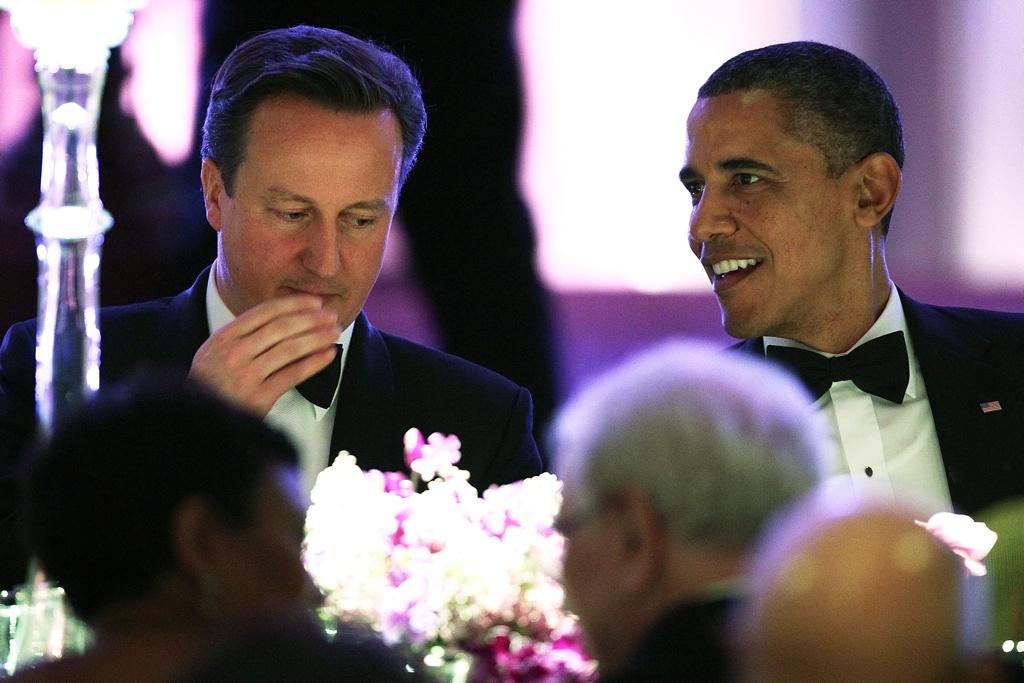US and UK: Special relationship is alive and well
U.S. President Barack Obama hosts British Prime Minister David Cameron for a state dinner at the South Lawn of the White House March 14, 2012 in Washington, DC. Prime Minister Cameron was on a three-day visit in the U.S. and he had talks with Obama earlier the day.
LONDON – After a period of feeling somewhat disrespected by Barack Obama, the American president’s charm blitz during the British Prime Minister David Cameron’s recent visit to Washington has reassured many Britons of what the Times of London described as “a relationship that, despite the tired cliché, remains fresh, vital and special.”
Only two years ago a parliamentary committee here warned that Prime Minister Tony Blair’s eagerness to join George W. Bush in attacking Iraq had hurt Britain’s standing in the world. The subservient “poodle” image is “deeply damaging to the reputation and interests of the United Kingdom," the parliamentarians said. “The Special Relationship is Over..,” headlined the left-leaning Guardian back in the spring of 2010. “Now Stop Calling Us America’s Poodle.”
The British, like most Europeans, were very pro-Obama when he came into office, but Obama had called himself a “Pacific president” and the old Atlantic Alliance seemed to be taking a back seat. Britons noticed Obama reaching out to Iran and the Muslim world, and, as the pro-American British writer William Shawcross put it, he seemed “kinder to his enemies than his friends.”
All that was swept away last week with the glitzy reception Cameron received in Washington, leaving Britons slightly baffled. Britons knew what was in it for them, but not exactly sure what was in it for Obama.
The “Special Relationship” has waxed and waned over the years. This is the 200th anniversary of the War of 1812 when the British burned down the White House in retaliation for Americans burning down what is now Toronto. Today the British are much more looking forward to anniversaries of defeating Napoleonic France then they are recalling wars with their American cousins.
More from GlobalPost: The lessons from Sgt. Robert Bales
In the American Civil War the British strived to stay neutral between North and South, which of course resulted in the resentment of both sides.
The North Star of special relationship believers, however, is the relationship that developed between Churchill and Roosevelt during WW II when the half-American Churchill went out of his way to ensure that the American colossus remained hitched to Britain’s wagon. But even then it was hard for the British to accept that they were very much the junior partners in the relationship.
“We are all profoundly disconcerted by the memorandum sent us by the United States Joint Chief of Staff on the twenty-fifth instant about ‘Torch.’” Churchill wrote to Roosevelt in August of 1942. “Torch” was the America invasion of North Africa, and Churchill wanted Algiers to be taken on the first day, not just Casablanca. “It seems to me that the whole pith of the operation will be lost if we do not take Algiers …,” he wrote. But Roosevelt had other ideas, and Roosevelt prevailed. The notion that Britain was going to direct the war with America docilely supporting British decisions was abruptly coming to a halt.
When President Dwight Eisenhower told Britain, France, and Israel to stop their invasion of Egypt in 1956 the special relationship reached a new low. The French took away from that incident that the Americans could never be completely trusted as allies. The British took home exactly the opposite message: that British foreign policy should never again stray too far from the Americans.
The relationship suffered during the Vietnam War when the British were unwilling to join what turned out to be America’s misguided effort.
But it reached new heights with political soulmates Ronald Reagan and Margaret Thatcher. Even then there were strains. A new book by Richard Aldous called “Reagan and Thatcher; The Difficult Relationship” relates how Reagan invaded Grenada, a British Commonwealth country, without even warning Thatcher, which caused her great embarrassment.
And one of the best scenes from the film “Iron Lady” comes when Secretary of State Al Haig was trying to talk Thatcher out of going to war over the Falklands. Thatcher wasn’t having any of it, and as it turned out, America tilted decisively towards Britain against Argentina.
During the Cameron visit Obama seemed to back the British position over the Falklands even more positively than had previous American policy.
It is the Afghan war that presents the two leaders with their greatest common problem. Cameron said that Ground Zero was “why what we do overseas is so important, so that people are safe at home.”
But the link between Al Qaeda and the 10-year struggle in Afghanistan is getting harder and harder to understand, and as Simon Tisdall wrote in the Guardian, the Afghan talks between the two leaders now “resembles a discussion between two undertakers about the most fitting way to dress a corpse. The nub: how to get out fast without appearing to get out fast.”
The story you just read is accessible and free to all because thousands of listeners and readers contribute to our nonprofit newsroom. We go deep to bring you the human-centered international reporting that you know you can trust. To do this work and to do it well, we rely on the support of our listeners. If you appreciated our coverage this year, if there was a story that made you pause or a song that moved you, would you consider making a gift to sustain our work through 2024 and beyond?
